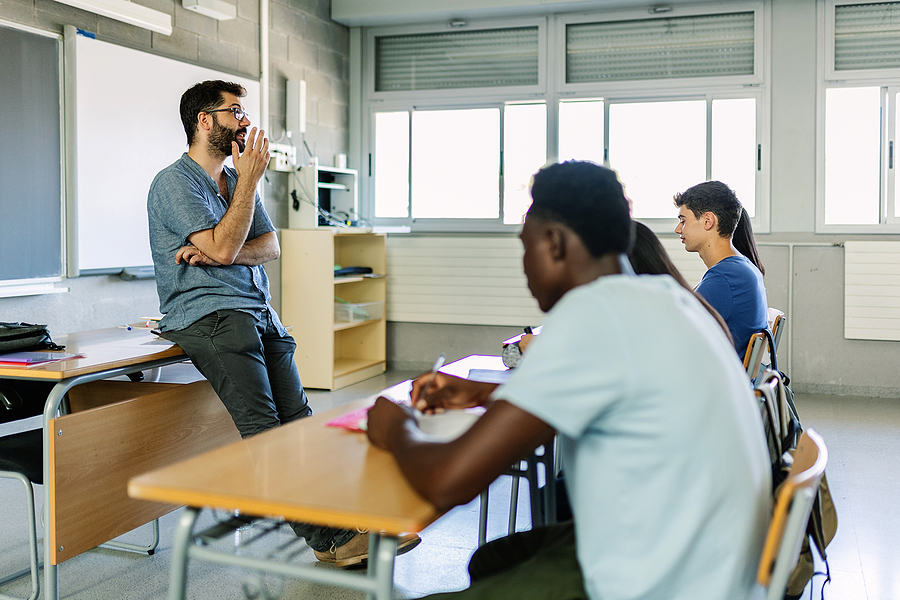
I know the orthodoxy of education is for lessons to be student centred. But I’m going to risk excommunication here by suggesting that there are times when it’s absolutely essential that classes be teacher centred. Literacy classes are such instances.
To go against one’s training and instincts by shifting focus to oneself (the teacher) is one of the many challenges of teaching a literacy class. It doesn’t take long, however, to see that the lower the level of a student’s English, the more guidance, scaffolding, and support they need from their teacher.
Literacy students range from pre-literate and non-literate to semi-literate, and mostly have little formal education. Often they cannot read or recognize letters, and do not have enough English to have a conversation. So, reading is about recognizing words and letters, while writing is about reproducing, rather than producing. They need tons of structure and modelling to build a foundation for using English. Here are a few of the strategies I use in my literacy class.
Teacher Talk. And Talk. And Talk.
Years ago, when I was a new teacher, an older teacher—a mentor—told me that it was wrong to have students read aloud in class, because the other students were hearing incorrectly spoken English. Teachers, she said, need to model the language for their learners. They need to hear the teacher’s pronunciation, intonation, and pace–a model to imitate. I’ve pretty much stuck to my old mentor’s counsel over the years, especially with low level classes.
We first learn a language orally, picking it up from hearing it from those around us. Same with literacy students: They’ll speak English long before they can read and write it. They listen intently to you. I have one student, an older Somalian woman, who repeats everything I say. It’s her way of learning.
It’s also important for a teacher to use the repetition technique as much as possible, where you repeat the same word again, and again, and again, and again. Repetition is the name of the game with literacy and low level classes.
Modelling and repetition are two important reasons why more teacher-talk in literacy and low level classes is important for teacher centred lessons.
Put Up That Scaffolding
When it comes to writing, literacy students need all the support you can give them. To start with, stop thinking of writing as writing, as in sentences and paragraphs. Instead, literacy teachers get their students to write words, such as shopping lists, names, dates, addresses, and emails. These tasks seem simple to us, but as anyone who has ever taught a literacy class knows, even having students write something as simple as the date can be a quagmire. So, put yourself in your students’ shoes, and see the task from their eyes. I’ve been getting the students to write the date on the board from day one this semester, but when I say the word “date” and write “date” on the board, many of the students still don’t know what I’m talking about.
So, when a student writes the date on the board, I give them scaffolding, like this:
Date:
T _ e _ _ a y, O _ t o _ e _ , 1 _ , 2 0 _ _
This scaffolding works. The students get it, and they can write the date, with a little help from their friends and their classmates giving them an assist. Even writing the date can lead to other learning opportunities, such as collaboration, and students becoming teachers.
A literacy class is like no other, sui generis, its own world. Pre-literate, non-literate, and semi-literate learners need a foundation of English to build upon, and that foundation starts with letters and numbers. Actually, no. That foundation starts with us, their teachers.

I agree. I have also found doing a lot of preparation with the class for a field trip and then going on the field trip and using all the language we’ve practiced is very helpful. We went on a trip to the grocery store after working on a grocery store module. After the trip we had a slide show of photos from he trip that we could talk about. Our next big project is a bake sale where they can practice their sales language like “How much is this?” and also practice giving change and reading prices.
Thank-you for your comments, Audrey. I like your activities, especially the field trips, taking the students to real world settings. That way, the students can see the connection between what they learned in the classroom and how language is used in the world. It’s not abstract.
Also, I agree with your comment on preparation. The more the scaffolding required, the more prep that’s needed.